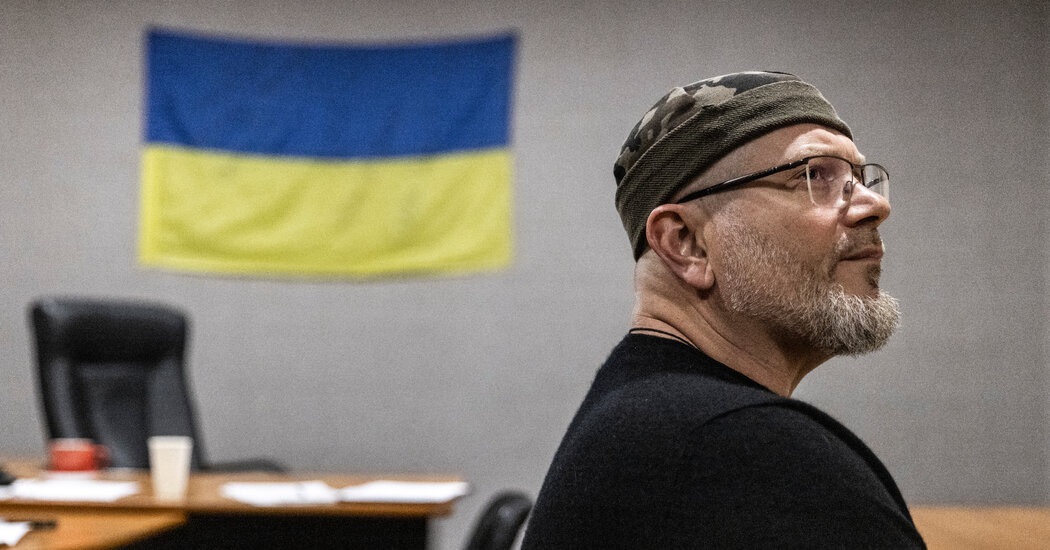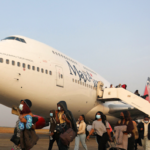
KRYVYI RIH, Ukraine — The solicitation to commit treason came to Oleksandr Vilkul on the second day of the war, in a phone call from an old colleague.
Mr. Vilkul, the scion of a powerful political family in southeastern Ukraine that was long seen as harboring pro-Russian views, took the call as Russian troops were advancing to within a few miles of his hometown, Kryvyi Rih.
“He said, ‘Oleksandr Yurivich, you are looking at the map, you see the situation is predetermined,’” Mr. Vilkul said, recalling the conversation with a fellow minister in a former, pro-Russian Ukrainian government.
“Sign an agreement of friendship, cooperation and defense with Russia and they will have good relations with you,” the former colleague said. “You will be a big person in the new Ukraine.”
The offer failed spectacularly. Once war had begun, Mr. Vilkul said, the gray area seeped out of Ukrainian politics for him. Missiles striking his hometown made the choice obvious: He would fight back.
“I responded with profanity,” Mr. Vilkul said in an interview.
If the first months of the war in Ukraine became a military debacle for the Russian army — deflating the reputations of its commanders and troops in a forced retreat from Kyiv — the Russian invasion also highlighted another glaring failure: Moscow’s flawed analysis of the politics of the country it was attacking. The miscalculation led to mistakes no less costly in lives for the Russian army than the faulty tactics of tank operators who steered into bogs.
The Kremlin entered the war expecting a quick and painless victory, predicting that the government of President Volodymyr Zelensky would fracture and that leading officials in the largely Russian-speaking eastern region would gladly switch sides. That has not happened.
The political myopia was most significant in the country’s east, political analysts say.
In all but a tiny number of villages, Russia failed to flip local politicians to its side. The Ukrainian authorities have opened 38 cases of treason, all targeting low level officials in individual instances of betrayal.
“Nobody wanted to be part of that thing behind the wall,” said Kostyantyn Usov, a former member of Parliament from Kryvyi Rih, referring to Russia’s isolated, authoritarian system.
He said that system had dismal appeal in Ukraine and noted the absence of widespread collaboration with Russia, including among Ukrainians who speak Russian and share the country’s cultural values.
“We are part of something bright,” he said of Ukraine. “It is here, with us, in our group. And they have nothing to offer.”
Other prominent, once Russian-leaning politicians including Ihor Terekhov, the mayor of Kharkiv, and Hennady Trukhanov, the mayor of Odesa, also remained loyal and became fierce defenders of their cities.
Along with leaders in the southeast, Ukrainian people also resisted. Street protests against occupation in Kherson continue despite lethal dangers for participants. One man stood in front of a tank. Kryvyi Rih’s miners and steelworkers have shown no signs of pivoting allegiance to Russia.
“Before the war, we had ties to Russia,” said Serhiy Zhyhalov, 36, a steel mill engineer, referring to familial, linguistic and cultural bonds. But no longer, he said. “No one has any doubts that Russia attacked us.”
Ukraine’s southeastern regions, an expanse of steppe and blighted industrial and mining cities, is now the focus of fighting in the war.
Driving south from Kyiv, the highway leaves behind the dense pine forests and reedy swamps of northern Ukraine, and the landscape opens into expansive plains. Farm fields stretch out to the horizons, in brilliant, yellow blossoming rapeseed or tilled black earth.
In many ways, the region is entwined with Soviet and Russian history. The iron and coal industries shaped southeastern Ukraine. In and around the city of Kryvyi Rih are iron ore deposits; the coal is farther east, near the city of Donetsk.
The two mineral basins, known as the Kryvbas and the Donbas, gave birth to a metallurgical industry that drew in many nationalities from around the Czarist and Soviet empires from the late 19th century onward, with Russian becoming the lingua franca in the mining towns. Villages remained mostly Ukrainian speaking.
The region for years elected Russian-leaning politicians such as Mr. Vilkul, a favorite villain to Ukrainian nationalists for promoting Soviet-style cultural events that angered many Ukrainians. He staged, for example, a singalong party in Kryvyi Rih to belt out “Katyusha,” a Russian song associated with the Soviet World War II victory.
More substantively, Mr. Vilkul ascended in politics under the former, pro-Russian president, Viktor F. Yanukovych, in whose government he served as deputy prime minister until street protesters deposed Mr. Yanukovych in 2014.
Much of the rest of Mr. Yanukovych’s cabinet fled with him to Russia. But Mr. Vilkul remained in Ukraine as a de facto political boss of Kryvyi Rih while his aging father served as the city’s mayor.
And he caught Moscow’s eye. In 2018, Mr. Vilkul said in the interview, he was told through an intermediary that “the time of chaos is over” and that he should now follow orders from Moscow if he wished to remain in politics in the southeast. He said he refused.
Russia-Ukraine War: Key Developments
Victory Day concerns. President Volodymyr Zelensky called on citizens to heed local curfews in the face of an increasing threat of Russian attacks. Officials in the country fear that President Vladimir V. Putin might use Russia’s Victory Day holiday on May 9 to ratchet up fighting and turn what he calls a “special military operation” in Ukraine into explicit, all-out war.
The Russians, he said, had not even bothered to court him, they only leveled demands. He said Moscow took the same approach to other politicians in Ukraine’s east. “They didn’t even try to convince us,” he said. “They just thought we would be, a priori, on their side.”
On the eve of the war, Mr. Vilkul was most likely the Russian-leaning politician in Ukraine with the broadest popular support. “I was alone on this level,” he said. He was also viewed by Moscow as a promising potential convert to its side when it invaded Ukraine.
That’s when the call came to Mr. Vilkul’s cellphone from Vitaly Zakharchenko, a Ukrainian in exile in Russia who had served as interior minister under Mr. Vilkul in Mr. Yanukovych’s government. He recommended Mr. Vilkul cooperate with the Russians.
“I told him to get lost,” Mr. Vilkul said. “I didn’t even consider it.”
Mr. Vilkul said he had been misunderstood — by Russia’s leadership and his nationalist opposition at home. A great-grandfather, he said, had fought White Russians in the civil war. The Vilkul family, he said, “has been fighting Russians on this land for a hundred years.”
The Kremlin, he said, had misinterpreted his respect for World War II veterans and support for rights of Russian speakers as potential support for a renewed Russian empire, something he said was a mistake. He called the Russians “classic megalomaniacs.”
“They mistook common language and values like attitudes to the Second World War and Orthodoxy as a sign that somebody loves them,” he said.
A second offer, this time presented publicly by another Ukrainian exile, Oleh Tsaryov, in a post on Telegram, came about a week later, when Russian troops had advanced to within six miles of the city. “My fellow party members and I have always taken a pro-Russian stance,” the post said, referring to Mr. Vilkul and his father, and added ominously that “cooperation with the Russian army means preserving the city and lives.”
Mr. Vilkul responded with an obscene post on Facebook.
On the first days of the invasion, Mr. Vilkul ordered the region’s mining companies to park heavy equipment on the runway of the city’s airport, thwarting an airborne assault, and on approach roads, slowing tank columns. The tires were then popped and engines disabled.
The city’s steel industry began to turn out tank barriers and plates for armored vests. Mr. Zelensky, whose hometown is Kryvyi Rih, appointed Mr. Vilkul military governor of the city on the third day of the war, though the two had been political opponents in peacetime.
Mr. Vilkul has taken to wearing fatigues and a camouflage bandanna. A parade of Ukrainian nationalists, including the leader of the Right Sector paramilitary, Dmytro Yarosh, and a prominent activist and military officer, Tetiana Chernovol, once sworn enemies of the Vilkul family, have shown up in his office to shake his hand.
“If we fight the Russians,” he said, “were we ever really pro-Russian, in essence?”
Maria Varenikova contributed reporting.




